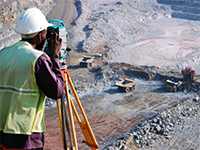Pushed and pulled by a variety of factors, private business actors from all over the world have gone beyond a narrowly defined understanding of social responsibility. Rather than seeking to increase their profits without deception or fraud, their corporate social responsibility agenda in developing countries usually features explicit objectives such as poverty alleviation, universal education and health care. Though there is little empirical data covering the socio-economic impacts of their actions over time, this global trend is also acclaimed in the mining sector.
PRIF Study No. 32 “Responsible Mining and Local Development in Kenya” by Andreas Jacobs contributes to the empirical closure of the research gap concerning the local impacts of the new global wave of corporate social responsibility (CSR) in mining in Kenya. The book’s analytical framework derives from a critical conceptualization of the local level-focused development promises propagated by the global advocates of responsible mining projects. Its constructivist-comparative methodology is based on a critical review of established impact assessment practices used in mining. The book’s principal finding is that, even though local people notice and appreciate managerial shifts towards increased social responsibility, the development claims made by company managements are non-credible because local people do not believe that responsible mining-induced development has ever occurred in their lives.
This PRIF Study is available at Nomos publishing house.
